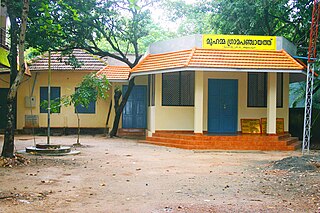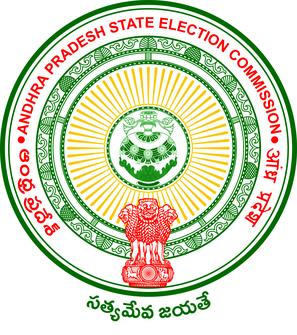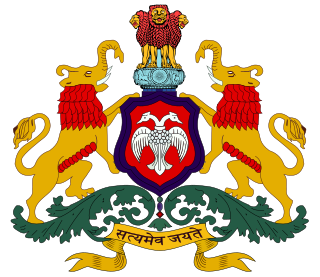A sarpanch, gram pradhan, mukhiya, or president is a decision-maker, elected by the village-level constitutional body of local self-government called the gram sabha in India. The sarpanch, together with other elected panchayat members, constitute gram panchayats and zilla panchayats. The sarpanch is the focal point of contact between government officers and the village community and retains power for five years. the term used to refer to the sarpanch can vary across different states of India. Here are some of the commonly used terms for sarpanch in various states: panchayat president, gram pramukh, gram pradhan, gram adhyaksha, gaon panchayat president, gram panchayat president, etc.
Panchayat samiti or block panchayat is a rural local government (panchayat) body at the intermediate tehsil (taluka/mandal) or block level in India. It works for the villages of the tehsil that together are called a development block. It has been said to be the "panchayat of panchayats".

Panchayati raj is the system of local self-government of villages in rural India as opposed to urban and suburban municipalities.
Local government. in Maharashtra State follows the general structure of Local Governance in India and is broadly classified into two categories: Urban Local Governance and Rural Local Governance.

Sangam Jagarlamudi is a village in Guntur district of the Indian state of Andhra Pradesh. It is located in Tenali mandal of Tenali revenue division. It forms a part of Andhra Pradesh Capital Region.
Amruthalur is a village in Guntur district of the Indian state of Andhra Pradesh. It is the headquarters of Amruthaluru mandal in Tenali revenue division. The village forms a part of Andhra Pradesh Capital Region and is under the jurisdiction of APCRDA.

Cherukupalli Mandal is one of the fifty seven mandals in Bapatla district of the Indian state of Andhra Pradesh. It is under the administration of Repalle revenue division of the district. The village of Cherukupalli is the administrative seat of the mandal.

Pedakurapadu is a town in Palnadu district of the Indian state of Andhra Pradesh. It is the headquarters of Pedakurapadu mandal in Sattenapalli revenue division.
Moinabad is a village in Ranga Reddy district of the Indian state of Telangana. It falls under Moinabad mandal of Chevella revenue division.
Vangipuram is a village in Guntur district of the Indian state of Andhra Pradesh. It is located in Prathipadu mandal of Guntur revenue division. It forms a part of Andhra Pradesh Capital Region.
Local government in India is governmental jurisdiction below the level of the state. Local self-government means that residents in towns, villages and rural settlements are the people who elect local councils and their heads authorising them to solve the important issues. India is a federal republic with three spheres of government: central, state and local. The 73rd and 74th constitutional amendments give recognition and protection to local governments and in addition each state has its own local government legislation. Since 1992, local government in India takes place in two very distinct forms. Urban localities, covered in the 74th amendment to the Constitution, have Nagar Palika but derive their powers from the individual state governments, while the powers of rural localities have been formalized under the panchayati raj system, under the 73rd amendment to the Constitution.
Punnelu is a village in Wardhannapet mandal, Warangal district, Telangana state in India.
Reddibavi is a village in Nalgonda district in Telangana, India. It falls under Choutuppal mandal. Reddibavi is part of the Gundlabavi Gram panchayat. This is one of the four major villages which are part of this Gram panchayat. The other three villages are Thumbavi, Saidabad and Gundlabavi. Majority of the population in this village follows hinduism. Gowds are the dominant community of this village. This village played an historic role in Telangana Rebellion and many of the socialist movements in the region.
The Tamil Nadu State Election Commission is an autonomous, independent Constitutional and Statutory authority of Tamil Nadu. It was formed under the Constitution of India as per the provisions of the 73rd and 74th Amendments Acts of 1992 on 15 July 1994. All Local Body elections of Tamil Nadu are conducted by this Commission.
Local bodies in Tamil Nadu constitute the three tier administration set-up in the South Indian state of Tamil Nadu. It is a system of local government which forms the last level from the Centre. Chennai Corporation in the then Madras Presidency, established in 1688, is the oldest such local body not only in India but also in any commonwealth nations outside United Kingdom.

Andhra Pradesh State Election Commission is a Constitutional authority agency of Andhra Pradesh, India. It was formed under the Articles 243-K and 243-ZA of Constitution of India. It conducts the Rural and Urban Local Body Elections in the Indian state of Andhra Pradesh.
Assam State Election Commission is an autonomous and statutory body constituted in Indian state of Assam for ensuring that elections are conducted in free, fair and unbiased way. Constitution of India with provisions as per Article 324 ensures creation and safeguarding of the powers of Election Commission. Assam State Election Commission is responsible for conducting elections for Urban Local Bodies like Municipalities, Municipal Corporations, Panchayats and any other specified by Election Commission of India. Assam State Election Commissioner is appointed by Governor of Assam.

Karnataka State Election Commission is an autonomous and statutory body constituted in Indian state of Karnataka for ensuring that elections in are conducted in free, fair and unbiased way. Constitution of India with provisions as per Article 243K and 243 ZA and Article 324 ensures creation and safeguarding of the powers of State Election Commissions. Karnataka State Election Commission came into existence with the promulgation of 73rd and 74th amendment to the Constitution of India on 26 May 1993 with an objective of superintendence, direction and control of the preparation of electoral rolls and to conduct all elections to the Urban Local Bodies and Rural local bodies like Municipalities, Municipal Corporations, Panchayats and any other specified by Election Commission of India. Karnataka State Election Commissioner is appointed by Governor of Karnataka.
Rajasthan State Election Commission is an autonomous and statutory body constituted in Indian state of Rajasthan for ensuring that elections in are conducted in free, fair and unbiased way. Constitution of India with provisions as per Article 243K and 243 ZA and Article 324 ensures creation and safeguarding of the powers of State Election Commissions. Rajasthan State Election Commission is responsible for conducting elections for Urban Local Bodies like Municipalities, Municipal Corporations, Panchayats and any other specified by Election Commission of India. Rajasthan State Election Commissioner is appointed by Governor of Rajasthan.
Local elections were held in the Indian state of Telangana in 2019 for various rural local bodies including 12,751 gram panchayats, 538 Zilla Parishad territorial constituencies, and 5,817 Mandal Parishad territorial constituencies. Gram panchayat elections were held in January 2019 whereas ZPTC and MPTC elections were held in May 2019.






